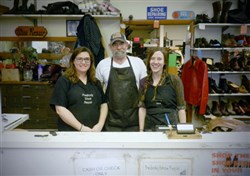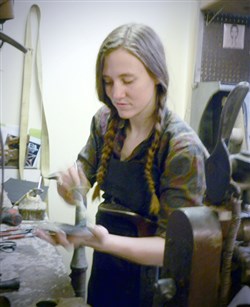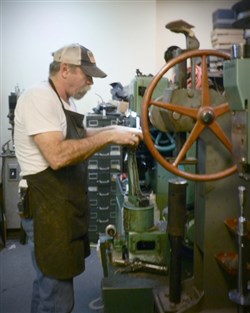VOL. 42 | NO. 3 | Friday, January 19, 2018
Cobbler’s life: Moving, adapting, passing it along

Katie Perry, Troy Horner and Bekah Cope of Peabody Shoe Repair on Thompson Lane.
-- Tim Ghianni | The LedgerThe lanky, country bassist knows cowboy boots demonstrate both the soles and the soul of his craft, so he’s not going to entrust them to just any old shoe repairman.
Soft-spoken cobbler Troy Horner’s walrus mustache rises along with his slight smile when the Nashville Cat and his wife – arms filled with boots – push their way into Peabody Shoe Repair at the back of a non-descript, U-shaped Thompson Lane strip center that’s easiest found by using the Mattress King sign as your landmark.
“Troy used to be in our neighborhood (Hillsboro Village), and we followed him here,” says Lee Francis – bass player for country singer Jon Pardi’s band – just as the second-generation cobbler steps behind the all-cash or checks – credit cards not accepted – cash register after trimming soles in the backroom workshop.
“I grew up in Nashville, and I like to stick with the guys who’ve been around a long time,” says Lee, referring to one of the last great cobblers in Music City.
“They always do a good job,” adds Lee, who – with the aid of charming and kind wife Jazzmen – totes a half-dozen pair of well-worn boots, secure they’ll get first-class rehab in the hands of Troy and the two women he mentors.
It’s not unusual for this hard-working trio to daily revitalize, re-stitch, re-sole and rub-shiny an average of 50 pairs of shoes and boots. Then there are the ball-gloves they restore and re-lace, the handbags of many colors and sizes … just about anything leather that needs repair.
A waist-length, ladies leather jacket hangs near the narrow passageway leading from the front of the shop to the back, where most repairs are performed.
“We’ve had to re-dye this,” Troy tells me as he examines the red-leather garment. “Looks good.”
This being the hometown of rhinestone cowboys, cowgirls and table-waiting wannabes, it makes sense that the pile of footwear brought in for repair regularly includes boots, soles worn and toes scuffed from activity on stages from honky-tonk to huge arena.
Lee’s boots display plenty of such wear-and-tear after eight years of roadwork with Pardi, who demonstrates his own footwear knowledge on Billboard charts with “Head Over Boots” and “Dirt On My Boots.”
Jazzmen and Lee swear Troy’s shop is the only place to have his “work boots” repaired.
It’s been a half-decade or so since Peabody Shoe Repair moved out of the Hillsboro Village area – it had occupied many different locations over the years – and opened at 718 Thompson Lane, Suite 105.
“Building that it was in last, at 21st and Acklen (in Hillsboro Village), was torn down. Apartments there now,” Troy says, adding his parents bought the business in 1976 so Troy’s mother, “would have something to do” while dad, John, worked for 39 years as a union electrician at Radnor Yard.
The name of the business reflects its Hillsboro Village heritage. “It started out as a business up on the Peabody campus. You know where that is?” Troy asks without the need to wait for an answer.
“That’s what it’s named for,” explains Troy, adding he can’t trace all locations Peabody Shoe Repair occupied during its long stint with two different families on 21st Avenue South.
“Dad bought this business from the widow of the owner,” he says. He can’t remember the guy’s name, but continues: “I think that owner was the second-generation of that family (to have the shop). Business could be 100 years old.”
This gentle soul, father of five – “my wife (Karen) and I got one of those ‘Brady Bunch’ deals going. I had two girls I had custody of, she had two boys and we have one together.”
The kids are grown and far removed from the cobbler trade.
“I made sure all my kids went to school so they’d have safe jobs,” away from fumes, dust and precision machinery. Even so, he wouldn’t mind if one of them takes over, though he adds he believes it unlikely. “But I do have grandchildren.”
Troy’s demeanor is warm and welcoming. But he prefers to work his leather magic rather than spend time talking to a visiting journalist. He laughs when I make that point.
“Best part of this is doing the work, by far,” says the almost-54-year-old before raising and lowering a hammer, rhythmically pounding a new heel into place. “I’m happiest while I’m working.”
He also is a patient mentor to two employees, helping them learn and improve their skills as cobblers.
Katie Perry, 26, (no relation to roaring pop star Katy Perry) has been here since 2015. Bekah Cope, 29, has been here two months. Both women ask Troy’s advice while they enthusiastically demonstrate their trimming, stitching, cutting, heel-making and other cobbler duties.
“I was a customer until I worked here,” says Katie. “I’ve always liked sewing and things, so on a whim, I asked if he was hiring. He was.”
She parked her college-prepped occupation – she has a degree in marketing from Jacksonville State University in Alabama – to become a cobbler.
“I seem to be more fulfilled by this work,” she adds. “Time goes by fast. And the pride you take in your work – this is a real detail-oriented job – gives me direct satisfaction.”
She adds she plans to stay “for good.”
Meanwhile, Bekah – trimming soles when I interrupt her – loves the precision of her new profession.
Her previous jobs have been in the kitchens of restaurants and working as a massage therapist. She also helped organize and promote garage and punk-rock shows. “Mainly, I just took pictures, mostly,” she says.
She studied the proper way to be a professional photographer in Murfreesboro.
“I went to MTSU for a couple of years. I just didn’t fit,” she recalls. She still uses her photographic skills for album covers and other rock products.
But cobbling could be the career, the trade, that satisfies her, and she, too, could stay here a long time, shooting rock bands on the side.
“We’re hands-on people. We need to work with our hands,” Bekah says, looking back at Katie.
Troy stops what he’s doing to demonstrate to Bekah how to properly split the heel between leather and rubber segments.

Bekah Cope has worked in restaurants and as a massage therapist, photographer and concert promoter.
Later, he jokes with her while demonstrating how she should trim leather for the soles. “You need to do it like this,” he says, working with his lip-knife, the most-necessary tool that all three carry with them full-time.
“You don’t want it to look like you did it with a chainsaw,” is the teasing advice he gives her.
“I want to learn,” she replies, showing off her trimming as the boss studies her work.
Another customer escapes the gloom of a wet January afternoon, his arms filled with shoes to drop off. He also has some to pick up, but “I can’t find my ticket,” says Gregory Higgs, 50.
Course, they know him, and Katie retrieves the finished shoes.
“This is the best place. I come down here from North Nashville,” Higgs points out. “Maybe it’s West Nashville.” (There is no border wall, but the geographic boundary between those two Nashville territories is at or near 28th Avenue North, by Swett’s Restaurant, I’ve been told).
As is usual for him, Gregory’s having new heels put on and “taps” installed.
Ignorant of the language of the cobbler, I at first ask Gregory if he’s a tap-dancer. The life of a North-or-West Nashville tap-dancer would make for a fine column sometime, I reckoned.
He laughs at my question. “No, they put taps here,” he shows me one of the repaired shoes that has had the small bit of metal – the “tap” – mounted on the back end of the heel.
“Anytime I need it done, I come here. They’re the best,” he says, nodding at Troy and company.
Another man comes in with a couple pairs of rubber-soled shoes and asks Troy if he can fix them … and how quickly?
“I can’t promise I can fix them, but I can try,” Troy tells the man, adding “we’re two weeks behind.”
The man silently grabs his shoes and stomps out the storefront.
“I guess he didn’t like what I said about fixing them. Or maybe he needed them quicker,” says Troy. “The worst thing that has happened, that has hurt cobblers, is injection-molded rubber (soles), like the ones you’ve got on.”
He points to my “work shoes,” black, leather New Balance walking shoes with rubber soles. (I wore red Chuck Taylors until my feet got old).
In a world where running shoes are worn daily by folks who probably have no plans to enter even a charity 5K, cobblers have lost business, Troy recounts.
Rubber, not leather, too often is what meets the road, sidewalk or even boardroom carpet.
“It’s a big problem,” Troy says, adding that while he attempts to repair rubber-soled shoes, he always tells the customer there is risk involved, they may be irreparable and the shop doesn’t assume liability.
Leather goods are, of course, his shop’s specialty. Even with the rubber-soles invasion, he’s been able to thrive. But rubber soles have forced many of his competitors to close. “There are only five, six real cobblers” left in Nashville, according to Troy, who says there used to be plenty of work to support many Nashville cobbling wizards.

Troy Horner uses a vintage stitching machine to reattach a sole.
-- Tim Ghianni | The Ledger“Twenty-five years ago, you could fix anything. But plastics, stuff like that has been hard on us,” Troy adds, then scans his still-thriving business.
“We are very fortunate to have had longevity. The ‘Peabody’ name’s been on the business so long,” he says, noting that the reputation and name-recognition is daily demonstrated. “We really try to do a good job, a fair job, a fair price. I hope people tell other people about us.”
The name and reputation of Peabody Shoe Repair is likely why his dad bought the business 42 years ago.
“Daddy and Mama still own the store,” Troy explains. He describes how his Mom, Irene, now retired, let her sons – Troy and Travis – taste the trade.
“We learned how to polish shoes and do other small stuff,” Troy says.
Troy didn’t become a cobbler as soon as he was grown. Instead, he worked construction and helped out in the shop during his off-time, but it didn’t take long for him to be convinced he needed to get back to where he once belonged.
“It never gets cold in here and you’re always dry in here,” he says, explaining just one of the pluses this profession offers.
“My brother ran this place for awhile, but he went into the automotive industry. I guess is the best way to say it,” Troy adds. Their sister, Lori, also worked for Peabody Shoe Repair before taking on the full-time job of homemaker.
A steady stream of regulars – most greeted by name – come through the door to either get shoes fixed or to pick up ones that are ready.
One of those customers won’t tell me his name – “I’m in too much of a hurry” – but he does acknowledge he can be called “a regular.”
Troy examines the shoes the man is dropping off and tells him what he can and can’t do.
The “regular” tells Troy what he really wants is to have higher heels. Troy quickly dissuades that notion. “I can put three-quarter (of an inch) heels on them and that’s all.”
“If that’s all you can do, that’s all you can do,” says this man of lesser stature. “Just make them as high as you can.”
The men exchange laughter as Katie tags the shoes with the owner’s name and other information. The shoes then go into a pile of “new jobs” that continue to arrive as the day presses on.
“The majority of what we do are men’s shoes,” Troy says. “But we do ladies’ heels, handbags …. We are a full-service shop. A lot of shops want to do it bigger. We just want to do it better. We are very particular.
“I think there’s only one other shop in Nashville that does zippers,” he says, holding up one of the zippered boots Katie is stitching in a small corner of the storefront. She’s also doing a bit of shoe tailoring.
“We take boots in, let them out,” like trousers, Troy says, using his lip-knife to show Katie how the zippered boot should be repaired. Sheepishly, he hands the boot back to Katie. She, he says, is far ahead of him and doing her job perfectly.
“It’s a hard job to do and make it right,” he acknowledges. “We try to make everybody happy.”
When his day is done, he drives home, to a 100-acre farm in Triune, where three family homes – his, his brother’s and mom and dad’s are separated by walking distance.
They do not farm the property. What Troy “grows” out there is a sense of calm.
“We moved out there from Antioch about 18 years ago,” he says. “I’d much rather drive an hour than live in Nashville.”
Although he laments the traffic sparked by boomtown Nashville, he praises millennials and their demonstrated good taste in footwear.
“I think they are buying better shoes now, and they want to save them,” rather than toss them out and buy new ones, Troy notes.
He adds that in times of trouble – like the 2008 recession – his business flourished, again because people didn’t just cast aside footwear, they brought it to him or other cobblers.
“There will always be a need for cobblers,” he says. “In fact, we’re so busy and behind that I could take another one (an aspiring cobbler) on right now.”
He shrugs and ducks back to the workshop.
“I’ve always enjoyed the work,” he says before again hammering home a heel.